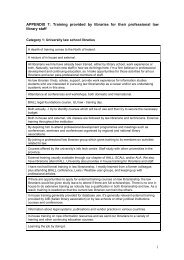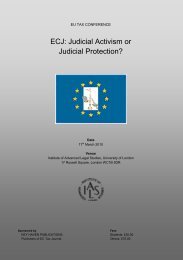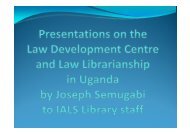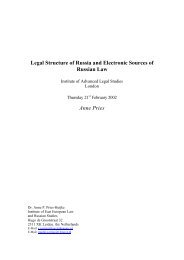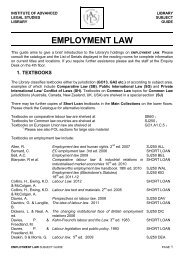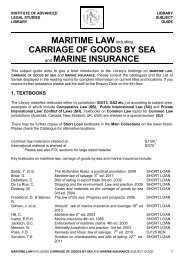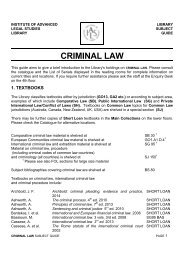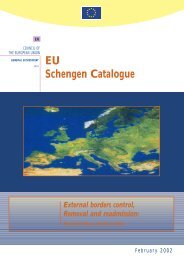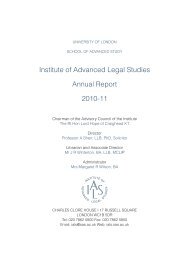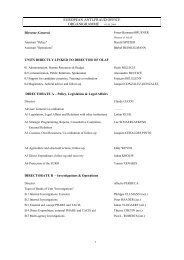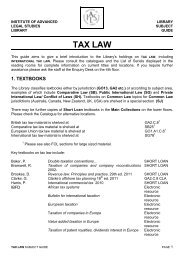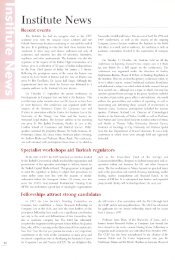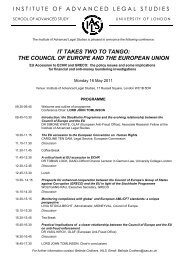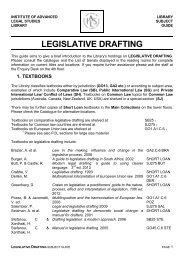a thesis - Institute of Advanced Legal Studies
a thesis - Institute of Advanced Legal Studies
a thesis - Institute of Advanced Legal Studies
You also want an ePaper? Increase the reach of your titles
YUMPU automatically turns print PDFs into web optimized ePapers that Google loves.
80 EXPRESS TRUSTS.<br />
The effect <strong>of</strong> the decision <strong>of</strong> the Court <strong>of</strong> Appeal in this case<br />
seems to be that there must be sufficient evidence to warrant a<br />
judge or jury in finding that the settlement was intended to delay,<br />
hinder, or defraud creditors. In the absence <strong>of</strong> any evidence at all,<br />
such an intent may be inferred from the fact that the necessary result<br />
<strong>of</strong> the settlement teas to defeat or delay the creditors. This inference<br />
is, however, one <strong>of</strong> fact only and not <strong>of</strong> law, and may be rebutted<br />
if the evidence as a whole shows that no such intention existed.<br />
(See Hunt, Fraudulent Conveyances, 2nd ed. 54, 55.)<br />
Illustrations.<br />
1. A., who is solvent at the time, but has contracted a considerable<br />
debt, which will fall due in the course <strong>of</strong> a few weeks, makes<br />
a voluntary settlement, by which he withdraws a large portion <strong>of</strong><br />
his property from payment <strong>of</strong> his debts. He then collects the rest<br />
<strong>of</strong> his assets and spends them recklessly, and as a consequence the<br />
expectant creditor remains unpaid. The settlement is void.<br />
Spirett v. Willoics (1864), 3 De GK J. & S. 293.<br />
2. A. has a life income <strong>of</strong> about 1,000?. a year, his only other<br />
property being a policy on his life for 1,000?., a copyhold cottage<br />
worth 50?., and some furniture. His creditors are pressing him,<br />
and in order to pay the most urgent he borrows from B. 350?., in<br />
consideration <strong>of</strong> which he conveys to B. the copyhold cottage and<br />
gives her a bill <strong>of</strong> sale on his furniture. The arrangement does<br />
not, however, enable him to discharge the whole <strong>of</strong> his indebtedness,<br />
and being still indebted, he executes a voluntary settlement <strong>of</strong> his<br />
life policy in favour <strong>of</strong> C., the result <strong>of</strong> which is to leave him<br />
insolvent. He then contracts a debt to D. The settlement is void<br />
as against D. Freeman v. Pope (1870), L. E. 5 Ch. App. 538.<br />
3. A. is married on May 31, 1881. In August, 1881, an<br />
action for breach <strong>of</strong> promise is commenced against him, and the<br />
writ is served on October 8, 1881. About the same time A. learns<br />
that he has become entitled to a legacy under his stepfather's will,<br />
and on the 17th October, 1881, he executes a voluntary settlement<br />
<strong>of</strong> the legacy on his wife for life, with remainders over. A. is not<br />
influenced in doing this by the action, which he then thinks will<br />
come to nothing. On July 20, 1882, judgment is given against<br />
him in the action for 500?., and he becomes bankrupt. The settle-



